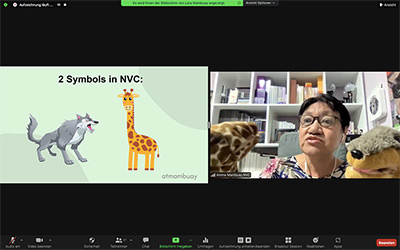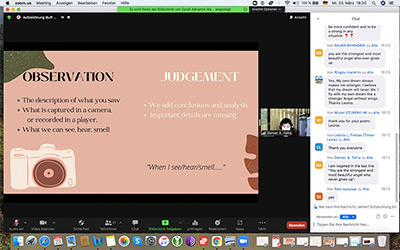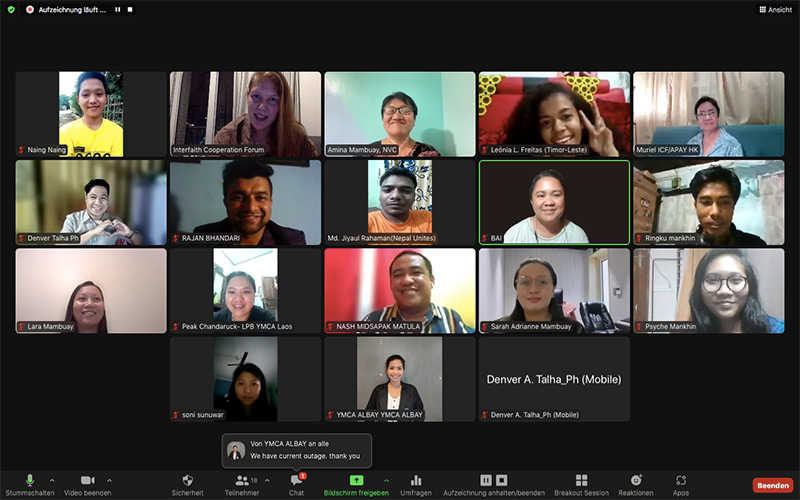ICF organized a virtual Training of Trainers on Nonviolent Communication
Last Updated (Tuesday, 03 May 2022 16:29)
From March 7th to 30th, 2022, the Interfaith Cooperation Forum conducted a ten-day Peace Institute of virtual Training of Trainers (ToT) on Nonviolent Communication. Twelve participants attended the training. Six (6) of them were male and 6 were females from six Asian countries, namely, Bangladesh, Laos, Myanmar, Philippines, Nepal, and Timor-Leste. The training-of-trainers sessions were held for three hours on Monday, Wednesday, and Friday every week. Tuesdays and Thursdays were set aside to work on assigned tasks to participants for practical learning. ICF expects the certificate holders of the ICF Peace Institute to contribute as facilitators in some ICF activities, as well as in activities in their local or national contexts beyond ICF. ICF reached out to a diverse group of young people who wanted to contribute to promoting peace through learning and practicing nonviolent communication.
The whole Training of Trainers went through different learning session outlines and practicum for the participants. The session outline was about the introduction of Nonviolent Communication, The NVC model, principles of NVC, four important key elements of NVC (Observation, Feeling, Need, and Request), Empathy, and NVC languages (Jackal and Giraffe language). The participants were expected to read two textbooks as required reading. Using Google classroom, they interacted with the facilitators, fellow trainees or “classmates,” and hosts. Through this platform, they submitted their written assignments and other documents, both for individual and group assignments. For a simulated practicum for group facilitation, the participants teamed up into three groups and prepared the module to be used for facilitation. They also wrote their everyday journal for reflections.
On Day One, on March 7, the Training of Trainers started with greetings from Mr. Nam Boo Won, the General Secretary of Asia and Pacific Alliance of YMCAs. Dr. Muriel Orevillo-Montenegro, the ICF Coordinator, gave an orientation on the program flow and introduced the work of ICF. The resource person, Ms. Amina T. Mambuay gave introductory inputs on the topics of nonviolent communication, such as The NVC model, and the principles of NVC. Ms. Lara Mambuay served as the assistant facilitator. Nonviolent communication is a practical and learnable process that leads people to communicate with themselves and others in a spirit of empathy and honesty. It helps people for expressing their own needs, desire, and values to fulfill by considering others from the heart.
 |  |
On the second and third days, the resource person gave her input on the four important key components of the NVC, namely, Observation, Feeling, Need and Request. These components play a vital role in meeting the mutual needs and aspirations of people with compassionate nature.
On the fourth, fifth, and sixth days, Ms. Amina focused her input on a more detailed look into what is empathy and what is not empathy. She presented the practice of the “four ears” (jackal in, jackal out, and Giraffe in, Giraffe out) process of listening and speaking. She showed how these processes are important in sending and receiving messages from each other with clarity and empathy as a form of NVC language.
On the seventh day, the resource person gave various information, directions, and suggestions to participants for the integration and practicum. She discussed in detail how to facilitate and conduct a nonviolent communication workshop. For the simulated practicum, the three groups with four members each prepared their modules.
On the eighth, ninth, and tenth days, the facilitating teams did their practicum on nonviolent communication for two hours. Each team invited 4 to 5 guest participants from their respective countries such as Bangladesh, Nepal, Philippines, and Timor-Leste. The guest participants responded actively and positively during the simulated practicum in facilitation. At the end of the facilitation, Resource persons, the staff of ICF, and other participants provided their valuable feedback, comments, and guidance for the participants to improve.

On the eleventh day, the participants read their written impressions or reflection about the training of trainers based on their daily journals. The participants as well as the resource person and the staff of ICF also expressed their impressions about the training of trainers. The participants shared what they have learned from the training of trainers and what kind of changes has come into their life. They expressed how the training encouraged them to use a language that increases goodwill and allows their natural compassion to flourish in their daily life. Everything added a new dimension to participants gaining new experiences and knowledge in nonviolent communication.
Rinku Mankhin
SOP 2019





